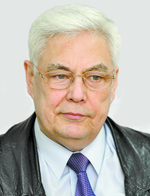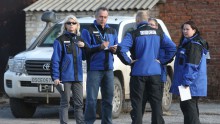It has seemed lately that implementation of the Minsk Agreements will gain a new impetus thanks to the deployment of an international armed police force in the Donbas, on which the Ukrainian side is insisting on the grounds that elections can only be held there if security is ensured. In particular, according to the President of Ukraine’s press service, “Normandy Four” leaders decided on May 24 that it is necessary to deploy an OSCE police mission in the Donbas.
However, the Kremlin has interpreted this agreement in a totally different way. At first the Russian president’s spokesman Dmitry Peskov said that OSCE’s armed representatives would be stationed on the Donbas line of contact, not on the Ukraine-Russia border. But Russia’s Deputy Foreign Minister Grigory Karasin announced the other day that they had not agreed to the deployment of a militarized mission in the Donbas and that all these matters should be negotiated in proper formats. He also added that “the verbosity of Kyiv strategists only spoils things” in this case.
Bankova Street immediately responded to this statement of the Russian foreign ministry. In particular, Kostiantyn Yeliseiev, Deputy Chairman of Ukraine’s Presidential Administration, said at a press conference: “We have clear-cut recordings of all the telephone conversations that comprise the Russian president’s consent to the deployment of an OSCE armed police mission.”
One way or another, the situation with this “on-the-phone deal” at least looks like misinterpretation or wishful thinking.
The Day requested Serhii PYROZHKOV, member of the working subgroup on political matters of the trilateral contact group, to comment on the establishment of an armed police mission and progress at the Minsk negotiations.
“WE NEED AN OSCE ARMED MISSION STATIONED THROUGHOUT THE TERRITORY OF THE OCCUPIED DONBAS”
 “Negotiations about an armed police mission in the Donbas are being held in the Normandy Four format as well as by way of bilateral contacts, but, as far as I can see, no final decision has been made so far.
“Negotiations about an armed police mission in the Donbas are being held in the Normandy Four format as well as by way of bilateral contacts, but, as far as I can see, no final decision has been made so far.
“As for the PA Deputy Chairman Kostiantyn Yeliseiev’s statement about recordings of the Russian and Ukrainian presidents’ talks, when Putin allegedly agreed to this kind of mission, I must say that verbal agreements are one thing, but when a decision has been made, it should be officially recorded. So it is difficult for me to say who is right or wrong. Besides, the results of verbal agreements are not the end of it. Each of the contacting parties may change its mind. I can see nothing unusual here. And if one of the parties fails to abide by its commitments, this only shows that it is taking an irresponsible attitude to these agreements.”
Indeed, Russia is taking a totally inconsistent attitude in this case. At first the Russian president’s spokesman Dmitry Peskov says that this mission’s jurisdiction covers the ceasefire line only, which does not suit Ukraine. But then the Russians say there were no agreements at all about an OSCE armed mission. Would you comment on this?
“Undoubtedly, we need an OSCE armed mission stationed throughout the territory of the occupied Donbas. Russia does not want to put up with this because it means that it will in fact lose the full control it is wielding now. This is a positional struggle for how to define and find a positive solution to this conflict.”
Mr. Pyrozhkov, on June 1 was the first time you took part in a session of the political subgroup of the Minsk Trilateral Contact Group. Do you think the opposite side (Russians and separatists) was aiming for a peaceful settlement of the conflict?
“No, it is not yet the case. They are advancing their interests and drawing up their legislative documents which fully serve the interests of the representatives of some districts in Donetsk and Luhansk oblasts. So, in my view, there is no progress. We must continue to negotiate. As a member of the subgroup for political matters, I must say there was a heated debate there and everybody stuck to their guns. We should seek some other levers of influence now to break this deadlock.”
Who do you think holds these levers of influence? What are we and our Western partners – Merkel and Hollande – supposed to do?
“I think we should work jointly with Merkel, Hollande, and the OSCE. If we do not take a joint attitude, it will be too difficult, unfortunately, to persuade the opposite side.”
But are we not taking a joint attitude? For both Poroshenko and Klimkin are saying about EU solidarity as to sanctions against Russia.
“Yes, we have solidarity at the level of the topmost leadership. But it is a multistage process, and positions at different levels do not necessarily coincide.”
As is known, our position is as follows: first security and then elections…
“I think this is the only possible position. In essence, one must take the comprehensive measures adopted in September 2014 in the Normandy Four format and recorded on paper. If you don’t take them, all the rest will be just an imitation of this work. Unfortunately, the Russian side is not taking these measures – instead, it proposes some of its own. For example, the Russians have drawn up an election law and some other documents and are insisting on a road map, but all this runs counter to the procedures accepted by all the sides – Germany, France, Ukraine, and Russia – which, regrettably, are not being carried out. Meanwhile, the first three items say that one must, firstly, cease the hostilities; secondly, withdraw heavy weapons; and, thirdly, establish OSCE monitoring over this process. Only after this can we begin to discuss peace initiatives, such as local elections and a changed status of some areas in Donetsk and Luhansk oblasts. There will be no essential progress in these matters unless the first three items are implemented.”
As there is no progress in the first three items, it means there are no ways to persuade Putin to change his point of view, on which the West pinned its hopes, imposing sanctions against Russia. What will you say to this?
“Sanctions do have an impact, but they can’t possibly be a magic wand – you wave it and everything changes at once. It is a long process, a longtime and ever-growing procedure. But you should note that Putin is not reacting to pressure and, on the contrary, his return steps are leading to an armed face-off. The West will not be overstepping a certain boundary line. So we must be aware of and take into account these realities.”
And, taking into account these realities, what should our leadership do?
“It should continue its line of actions, defend its position, and try to ensure that fire is ceased and heavy weapons are withdrawn because people are dying. That’s the main thing. Should the current situation continue, there will be a ‘frozen hot’ conflict. You must have heard Lavrov quoting Putin: unless Ukraine accepts the Russian position, they will go on shooting. What is to discuss here?
“So there’s nothing else left for us to do but stand our ground at all levels, including the formats of Normandy Four and the Trilateral Contact Group in Minsk. Naturally, we must also use the good offices of some other countries, such as the US and the EU, in order to pressurize Putin into carrying out the Minsk Agreements.”








